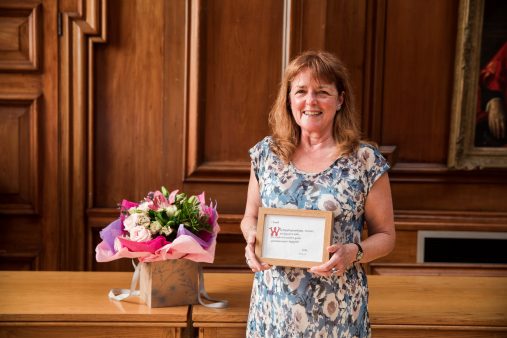My Cardiff is… Welsh for all
6 November 2017
Professor Sioned Davies (BA 1976) Professor, translator and former Head of Cardiff University’s School of Welsh.
“I never intended to study Welsh. I arrived at Cardiff University in 1973; I had been accepted to do joint honours in French and German. But I was persuaded to take Welsh as a third subject. It seemed inconsequential at the time, but I haven’t looked back since.
“Coming to Cardiff was very exciting for a girl brought up in rural mid-Wales. Under Miss Howe’s eagle eye in Aberdare Hall, I quickly made lifelong friends and settled into student life, from wild Saturday nights in Mont Merence, Tito’s and Qui Qui’s to the more sedate 9 o’clock lectures on the Latin element in the Welsh language. I even risked the Welsh Department’s wrath when I sneaked off to Paris, to watch Wales play – and beat – France at rugby.
“After graduating, I spent three years at Oxford. But Cardiff lured me back; I’ve been here lecturing since 1979 – that’s testimony in itself to the appeal of what has blossomed into a vibrant, cosmopolitan city.
“Much has changed. I’ve worked under five Vice Chancellors, been Assistant Dean of a Faculty of Arts and Social Sciences, and seen the School of Welsh adapt to the changing demands of the 21st century.
“Most recently, the development of the Welsh for All programme has enabled hundreds of students, both home and international, to learn Welsh at Cardiff.
“The enthusiasm and dedication of the staff – each one willing to go the extra mile to support students and each other – mean it has been a real privilege to lead the School for over 20 years.
“I intend to return to lecture, but now I have a year’s study leave to continue my work on the tales of the Mabinogion. Among other things I’ll be examining how these stories were re-created, with illustrations, for 19th and early 20th century audiences.
It’s true to say that over the past 40 years, Cardiff University has played a key role in my life.”
Sioned’s translation of the Mabinogion – one of Wales’ greatest contributions to European literature – was originally intended primarily for academic use. However, its accessibility has led to a revival of interest well beyond academia. National Poet of Wales Gwyneth Lewis (Hon 2005) says: “The translation has changed what’s possible for writers in both Welsh and English, in Wales and beyond.”
- January 2026
- November 2025
- September 2025
- July 2025
- June 2025
- May 2025
- April 2025
- March 2025
- February 2025
- January 2025
- October 2024
- September 2024
- August 2024
- July 2024
- June 2024
- May 2024
- April 2024
- March 2024
- February 2024
- January 2024
- December 2023
- November 2023
- October 2023
- September 2023
- August 2023
- July 2023
- June 2023
- May 2023
- April 2023
- March 2023
- February 2023
- January 2023
- November 2022
- October 2022
- September 2022
- August 2022
- July 2022
- June 2022
- May 2022
- April 2022
- March 2022
- February 2022
- January 2022
- December 2021
- November 2021
- October 2021
- September 2021
- August 2021
- July 2021
- June 2021
- May 2021
- April 2021
- March 2021
- February 2021
- January 2021
- December 2020
- November 2020
- October 2020
- September 2020
- August 2020
- July 2020
- June 2020
- May 2020
- April 2020
- March 2020
- January 2020
- December 2019
- November 2019
- October 2019
- September 2019
- August 2019
- July 2019
- May 2019
- April 2019
- March 2019
- February 2019
- January 2019
- December 2018
- November 2018
- October 2018
- September 2018
- August 2018
- July 2018
- June 2018
- May 2018
- April 2018
- March 2018
- February 2018
- December 2017
- November 2017
- October 2017
- September 2017
- August 2017
- July 2017
- June 2017
- May 2017
- April 2017
- March 2017
- February 2017
- January 2017
- November 2016
- October 2016
- September 2016
- July 2016
- June 2016
- May 2016
- April 2016
- March 2016
- February 2016
- January 2016
- December 2015
- November 2015
- October 2015
- September 2015
- August 2015
- January 2015
- December 2014
- November 2014
- September 2014
- August 2014
- May 2014